Our steering group
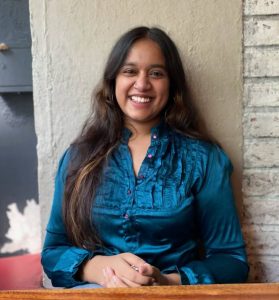
Shifa Afzal
MSc Business and Organisational Psychology
Westminster Business School
As a Muslim woman, Shifa has experienced prejudice based on both her gender and religion. These situations have often felt deeply unfair, leaving her with a sense of helplessness. She is committed to joining societies and initiatives that advocate for equality. She is part of the Pedagogies for Social Justice project and the Black, Asian, and Minority Ethnic (BAME) Voices project at the university, both of which aim to create more inclusive and empowering environments. Through these efforts, she strives to help people like herself feel valued, empowered, and heard.

Dr Tanveer Ahmed
Visiting Lecturer at the Royal College of Art, Goldsmiths University and the University of London (CSM)
After years of both learning and then teaching dominant Eurocentric capitalist models of fashion design, Tanveer has completed her PhD at the Open University to investigate ways of teaching anti-capitalist and anti-racist forms of fashion design. As a female of South Asian Indian heritage, she has been inspired by decolonial and black feminist literatures which have given her the confidence to draw on my family histories to practice alternative fashion design pedagogies centred around a politics of love as a tactic to disrupt and replace neoliberal educational agendas.
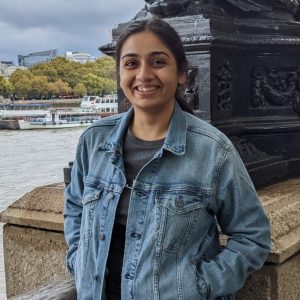
Aysha Ali
PhD researcher
Aysha Ali is a PhD researcher and recipient of the Quintin Hogg Studentship at the University of Westminster. Her research investigates how colonial ideologies related to race and religion have influenced political narratives in India, with a particular emphasis on their impact on contemporary advertising. By analysing the representation of marginalised communities, such as Muslims, in Indian advertisements, she seeks to reveal how colonial legacies persist in media practices, shaping societal perceptions and reinforcing power dynamics. Prior to pursuing her PhD, Aysha spent seven years in India’s advertising industry as a 3D generalist, crafting visual narratives for a variety of campaigns. This practical experience significantly informs her academic work. Beyond her research, she enjoys pottery, climbing, and animated films.

Kyra Araneta
Lecturer in Student Partnership and Social Justice | PSJ Co-ordinator
Sociology BA Graduate | International Relations MA
Having recently completed her Master’s degree, Kyra has continued her work in the Pedagogies for Social Justice project and been appointed lecturer in Student Partnership and Social Justice in the CETI (Centre for Education and Teaching Innovation). As a woman of Mixed African-Asian descent, Kyra’s journey through higher education has been deeply introspective and interwoven with the complexities of confronting colonial entanglements in academia. As a coordinator of the Pedagogies for Social Justice project and co-host of the project’s podcast, Kyra dedicates herself to creating spaces for dialogue, encouraging diverse perspectives, amplifying student voice, and bringing oppressive frameworks within academia to light.

Dr Ipshita Basu
Reader in Global Development and Politics
School of Social Sciences
Ipshita is a political sociologist, specialising in the area of Development Justice for indigenous and marginalised communities. Originally from Eastern India, she has spent more than two decades in the U.K. Britain's encounter with Asia and Africa, has determined her life, family and circumstances in so many ways. When she first arrived in Coventry for a M.A. in Sociology at the University of Warwick, the hostel warden asked her, "how can you speak the Queen's English?", to which she replied, "well because you lived with us for over 300 years!". Her role models are her maternal grandparents, who left India to build the railways in Kenya in the early 20th century, and her paternal grandparents, who were true cosmopolitans in a time of heightened nationalism in British Kolkata. Today, Ipshita's interactions with indigenous subalterns from India, Bangladesh and Sri Lanka, give her the purpose, the direction and the motivation to creatively decolonise research methods and learning. She believes that decolonising is political and self reflective, as it is not only about correcting representation of minorities in extant structures, but it is also about considering how we think about ourselves- our emotions, our values, our minds and how this affects our relations with others.
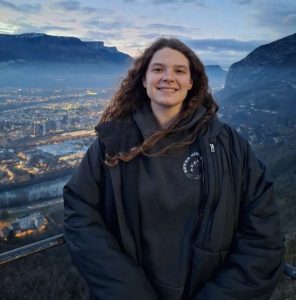
Jess Bollinger
MA in International Relations and Democratic Politics
My name is Jess Bollinger (she/her). I have been working with the Pedagogies for Social Justice since April 2025. During this time I was also pursuing my MA in International Relations and Democratic Politics- emphasizing on human rights and decolonization. I have recently submitted my dissertation as well. Before my MA, I received my BS in Political Science and my BA in History in the United States. Outside of studies, I enjoy: reading, activist work, traveling, languages and being in nature. I hope to work within human rights organizations in the future.
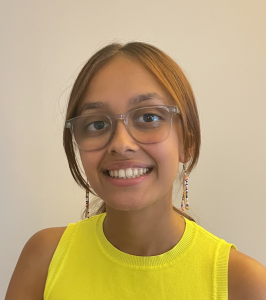
Kelsea Costin
Westminster Alumni
BA Sociology
Since diving into the world of Sociology in the first year of her undergraduate degree at the University of Westminster, Kelsea has been eager to learn about how she can help in the fight for social justice, particularly drawing inspiration from Critical Race theorists and Black Feminist scholars. Her heritage as a Mixed White and Black Caribbean woman has enabled her to acknowledge, and more importantly challenge, white privilege and systemic racism, and has largely contributed to her passion for decolonial work in the university. In her role as a Research Intern for the Pedagogies for Social Justice Project, she continues to bring to light the voices of Indigenous scholars in her discipline, and wishes to continue in her allyship after leaving university.
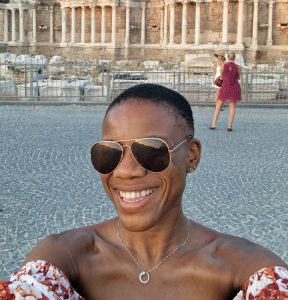
Dr Krystal Douglas Dodd
Centre for Education and Teaching Innovation (CETI)
Dr Krystal Douglas-Dodd (she/her) is a Black British Caribbean woman, researcher and evaluator in the CETI. Her work is centred around improving student outcomes, whilst challenging the structural inequalities at play in the English education system. It's guided by the idea that designing methods that are fun, engaging and encourage creativity, can encourage voices that are underrepresented in research, policy and practice, to feel empowered and share the uniqueness of their experiences. Her days are usually a combination of meetings, data analysis, and translating complex concepts into practical applications. Outside work, she's usually found walking her dog and exploring the Northeast of England with her wife and daughter, watching sport or cooking up a storm (...often a mess) in the kitchen!
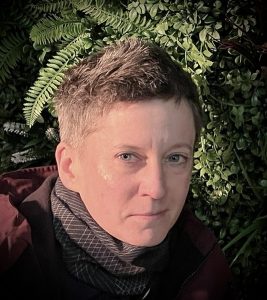
Elantha Evans
Independent scholar-architect-educator-learner-writer-activist
Visiting Researcher with CETI (University of Westminster)
PhD (2025) ‘Architecture education, with empathy: a theoretical and qualitative study of the potential of empathy and empathetic practices in the architecture design studio’
Working in support of developing architectural pedagogies for social and creative justice that have longevity, Elantha’s upcoming research project ‘Architecture’s Future Tutors. Who gets to ‘teach’ and why?’ is a collaboration between PSJ and the School of Architecture + Cities. It focusses on how architecture might work towards distributive justice specifically as it relates to how educational or academic roles and opportunities are distributed across social groups. Elantha believes that alongside deepening understandings of one another, working methods, diverse knowledges, interests and cultures, lived-experiences and personal interpretations, we must also explore how these can be embedded and activated in our learning, teaching, disciplinary practices and institutional structures. Their book ‘Dialogues & Dreams’ (2020), co-produced with ex-students, presents the diverse work and voices of a second-year architecture undergraduate design studio and reflects upon how more inclusive pedagogical approaches can support students in that key interstitial year of (relative) freedom between arrival and graduation.
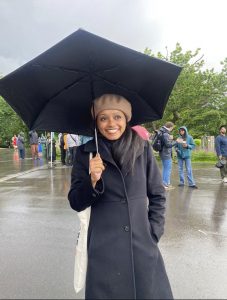
Nathasha Fernando
Lecturer, Researcher, Podcaster
School of Media and Communication
Dr. Nathasha Fernando is a lecturer, researcher and podcaster who spends her time thinking about how digital media can challenge racism and build solidarity across borders. Based at the University of Westminster, she teaches students to tell stories that matter and leads the MA Digital Media: Storytelling and Production, and co-leads the MA Social Media and Digital Communication. She co-hosts Sulla Razza, an Italian podcast (sponsored by Juventus FC) that breaks down complex ideas about race for everyday conversations. Born and raised in Milan-Italy and with Sri Lankan origins, Nathasha believes education should be about decolonising knowledge and amplifying voices that have been historically silenced. Outside of academia, she's usually found experimenting with new recipes, playing with the ’Samba Sisters Collective’, trying to learn a new skill (currently DJing), or having nice long walks.
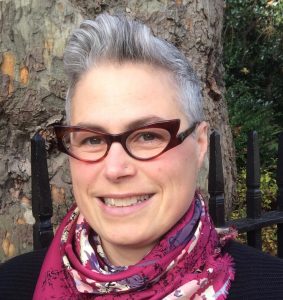
Dr Jennifer Fraser
University Director of Student Partnership at the Centre for Education and Teaching Innovation
Principal Lecturer at the School of Social Sciences
A non-binary queer academic at the University of Westminster, Jennifer has spent the past 20 years in the UK teaching and researching at the intersections of literature, gender studies, queer theory and critical pedagogies. Their approaches to education are also shaped by experiences as a white settler migrant in Canada and by growing up between different linguistic and geographic spaces of ‘home’. These both/and experiences of identity formation have taught them to centre building relationships and sharing stories to develop collaborative analyses. Jennifer loves that the Pedagogies for Social Justice project brings them into contact with other dreamers and co-conspirators for change.
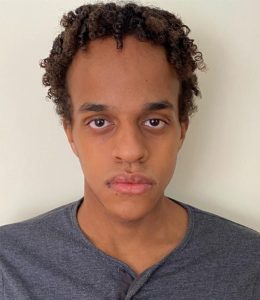
Jeremiah Chantre Gomes
Global Diplomacy and Politics MA
'Jeremiah 'Jay' Chantre Gomes (he/)him is a first second year MA student in Global Diplomacy and Politics. His current interest is in dismantling systems that make it systematically unfair for minority groups to function in. As a black person ; Jay thinks there are discussions that need to be held and believes that the Pedagogies for Social Justice project will bring these topics forward in order to tackle them.'

Dr Kate M. Graham
Senior Lecturer in English Literature (Theatre) in the School of Humanities
Director of the School of Humanities New Writing Festival | Co-Director of the Queer London Research Forum
A neurodivergent, queer woman from London, Kate (she/her) is a Senior Lecturer in English Literature (Theatre). She is the co-director of the Queer London Research Forum, is the EDI Lead for the School of Humanities, and sits on the steering committee for Black History Year.
Sara Hafeez
Academic Liaison Librarian for School of Media & Communication
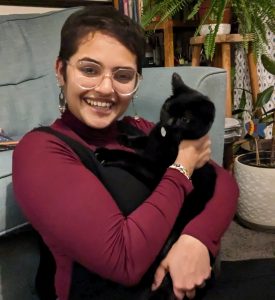
Jo Hemlatha
Writer-activist
Lecturer at London School of Economics
Jo spends their time imagining worlds where we are not constantly responding to violence, and everything they do is in the hope that we get to live in that kind of world. At the moment, they are a writer-activist who works at the LSE, teaching Gender, Sex, Kinship and Methods. They write about disembodiment, absurdities of life, social movements, and pain tied to responding, and being in a fast paced world. Jo is involved with multiple open-access projects bridging anthropology and advocacy, most notably Almaarii (a visual anthropology of South Asian queer closets) and Trans/form (a project to understand anti-trans violence in India) among others. Here's your waytojo.

Huanyu Huang
PhD researcher
Huanyu is doing her PhD at the University of Westminster, to explore the relationship between social media and feminism campaigns, and the feminist narratives in the non-western social context. As a feminist and an East Asian woman, Huanyu believes that the perspective of feminism and the voice of East Asians are of great significance in discussions of higher education issues. She hopes to use them as approaches to contribute to the Pedagogy for Social Justice project.
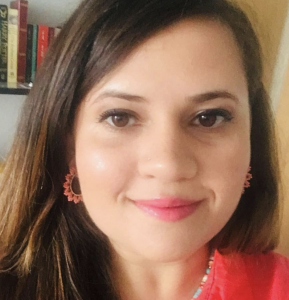
Dr Fatima Maatwk
Student Partnership Lecturer at the Centre for Education and Teaching Innovation
An Egyptian-German, female, Muslim woman lecturer and researcher at the University of Westminster. Existing at the intersections of what is often socially perceived as contradictory identities – Arab-Western-Muslim-liberal – resulted in a constant process of having to culturally translate her ‘self’, attest the appropriateness of her values and compatibility of her identities. Fatima spent her life between Egypt and Germany and has been living in the UK for the past five years, where she finished her doctorate and is continuing her professional path.
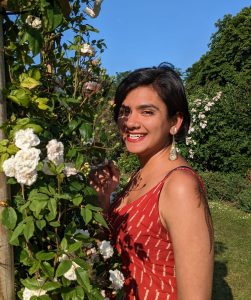
Annapurna Memon
Teaching Associate in Politics and International Relations
University of Sheffield
Annapurna Menon (she/her) is a Teaching Associate in the Department of Politics and International Relations at the University of Sheffield. She works with postcolonial and decolonial approaches, aiming to bridge the gap between theory and praxis. She loves engaging with her students and is interested in utilising decolonial approaches to reinforce the importance and joy of learning while emphasising criticality. Currently, she is thinking about resistance in pedagogies. Her doctoral research focused on the coloniality of postcolonial nation-states, specifically examining the Indian nation-state's exercise of power in Indian-administered Jammu & Kashmir. Additionally, she has published works on topics relating to Hindutva, right-wing politics, gender, and activism.
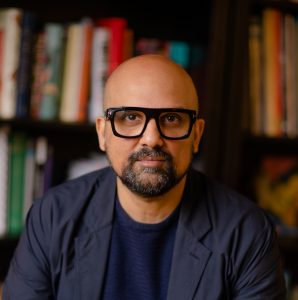
Samir Pandya
Assistant Head of the School of Architecture + Cities
Samir Pandya is an architect and Assistant Head of the School of Architecture and Cities, University of Westminster (London), where he is also Director of International and Lead for Equity Projects. He has designed a wide range of award-winning buildings in practice, and has been a Visiting Professor at APIED School of Architecture, Anand (India), an External Examiner at the University of Johannesburg (South Africa), and a PhD Co-Supervisor at the Università Iuav di Venezia, (Italy). His committee memberships and chairships have included the Society of Black Architects (Executive Committee), RIBA Education Committee (Member) and Architects for Change (Chair). He is currently an External Examiner at the University of Dundee (Scotland). He has served on numerous juries and awards, including for the National Association of Students of Architecture in India, the 2018 RIBA Annie Spink Award for Excellence in Architectural Education, and the 2022 RIBA President’s Medals. In addition to being Co-Editor of National Identities: Critical Inquiry into Nationhood, Politics & Culture (Taylor & Francis), he is an Editorial Board member for FOLIO (Journal of Contemporary African Architecture) and Veranda, the peer-reviewed journal of Sushant School of Art & Architecture, Delhi (India). He is also on the Academic Advisory Board for the pioneering African Futures Institute, Accra (Ghana). He is the current Chair of the RIBA President’s Dissertation Medal, and was one of 14 tutors invited to teach at the Biennale College Architettura (on the subject of Decolonising Architecture) at the 2023 Venice Architecture Biennale. His new book, After Belonging: Architecture, Nation, Difference (Routledge, 2023) examines the complex bond between architecture, spatial politics, and complex forms of collective (non-) belonging.
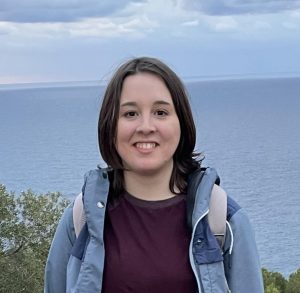
Lara Pownall
Biomedical Science BSc
Lara Pownall (she/her) is a second-year BSc Biomedical Science student at the University of Westminster. As a mature-aged disabled student who entered higher education through a foundation year, she understands firsthand the extra challenges disabled students can face in this space. Lara has been engaged in student partnerships to impact pedagogical practices, with the aim of creating a more socially just learning environment. She is dedicated to amplifying the voices of disabled students to encourage positive, meaningful change towards equitable opportunities in higher education. Lara’s experiences at university have helped her co-deliver workshops on how student partnerships can help build an equitable and decolonised life sciences curriculum. In addition to her studies, Lara works part-time as an inpatient Nursing Assistant in the NHS, which has furthered her passion for addressing healthcare inequities. In 2023, she attended a summer programme in Canada at the University of British Columbia’s Faculty of Medicine on obstetrics and gynaecology, in which she was fortunate to learn about their work to promote accessibility to culturally sensitive healthcare for Indigenous communities.
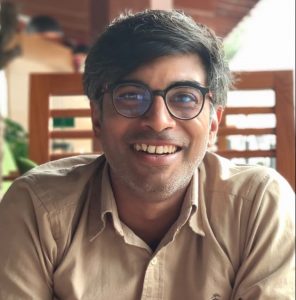
Arunopol Seal
Doctoral Research Fellow
Arunopol Seal is an action researcher and educator dedicated to designing and conducting research that initiates social action for positive change. Currently, he serves as the Quintin Hogg Trust Doctoral Research Fellow at the Centre for the Study of Democracy, University of Westminster, and Co-Leads the Qualitative Research Vertical at Policy and Development Advisory Group (PDAG LLP). His work primarily examines how development discourse influences society, the environment, and politics. Arunopol has collaborated closely with Adivasi communities in central and east India, helping them form democratic groups to improve self-governance through collective, critical engagement. His research methodology emphasizes the critical rethinking of core humanities and social sciences methods, fostering collaboration, trust, and mutual learning. Outside of his research, Arunopol enjoys rock climbing, photography, and cooking.
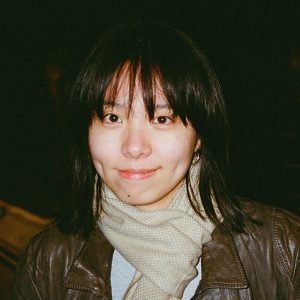
Geyujing Shen
PhD researcher
Geyujing Shen (she/her) is a first-year PhD student at the Centre for Social Justice Research at the University of Westminster. Her PhD focuses on Exploring the decolonial framework of queer theory by focusing on Chinese female queer student immigrants via visual lenses.
As both a researcher and an art practitioner, she is committed to incorporating creative methodologies into sociological research. Her approach aims to challenge traditional hierarchies by involving participants in the research process as co-creators. Her research focuses on fostering healing and empowerment by examining the lived experiences of Chinese queer student immigrants, exploring how their identities and challenges are shaped by cultural and social transitions. By creating spaces for mutual dialogue and expression, she fosters deeper understanding and shared agency between researchers and participants.
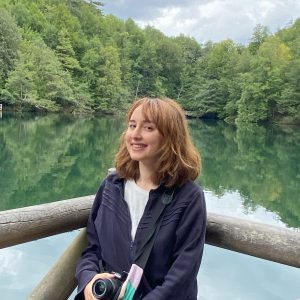
Ozge Suvari
PhD researcher
School of Architecture + Cities
Ozge is a PhD student investigating the relationship between high-tech agriculture and Mediterranean cities, with a special emphasis on climate change, labour, and migration. Influenced by her background with the Yuruks, a Turkish semi-nomadic group, Ozge's heritage enables her to critically examine contemporary farming practices within the broader context of the global food supply chain. Before her doctoral studies, she served as an adjunct lecturer and practising architect in Turkey, where she was committed to designing public spaces and buildings in culturally and environmentally sensitive contexts. Her architectural projects, underpinned by the conviction that power dynamics are deeply embedded in spatial design—from national museums to places of worship and educational institutions—have shaped her pursuit of socio-environmentally equitable "making" practices. Ozge values the transformative potential of narratives to alter perceptions of space and power and pursues representation and storytelling as essential tools for public engagement.

Esra Tahir
Biomedical Science BSc
Growing up as a third-culture kid, Esra’s diverse cultural experiences have deeply influenced her identity and perspective. As a Black woman in STEM and a proud feminist, she is dedicated to breaking down barriers and advocating for representation in science. Since embarking on her studies in Biomedical Science, Esra has become captivated by the brain’s profound role in shaping who we are. With a deep interest in neuroscience and mental health, she is fascinated by how the brain’s complex networks influence behavior, emotions, and identity. Esra’s academic journey is driven by a desire to understand the intricate relationship between brain function and mental health, with the goal of contributing to research that uncovers new ways to treat and support those affected by neurological and psychological disorders.
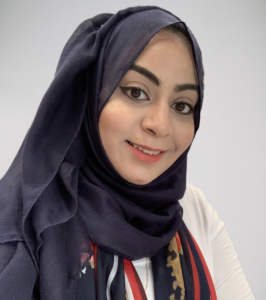
Dr Moonisah Usman
Lecturer
Centre for Education and Teaching Innovation (CETI)
Dr Moonisah Usman is Lecturer in the Centre for Education and Teaching Innovation (CETI), University of Westminster. She is a British Pakistani Muslim who grew up in London and developed a commitment to supporting minoritised students in higher education. In the CETI, she teaches on the
foundation programme, leading a core university-wide module ‘Critical Thinking for Academic and Professional Development’. She also leads the level 5 module ‘Power, Privilege and Public Health Challenges’, which combines her interest in health disparities and social disadvantage. Moonisah’s background is in obesity and molecular genetics research, and her current works explores environmental, nutritional, and social determinants of genome health. She is also part of the Centre for Social Justice Research where she investigates how student partnership and anti-racist pedagogy can produce more equitable outcomes for higher education and society.
University of Westminster
309 Regent Street, London W1B 2UW
General enquiries: +44 (0)20 7911 5000
Course enquiries: +44 (0)20 7915 5511
The University of Westminster is a charity and a company limited by guarantee. Registration number: 977818 England